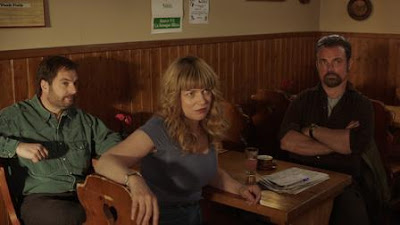As directed by John Balazs from a screenplay by Michael J. Kospiah, the filmmaker wastes way too much time on "establishing shots" that, once established, just go on and on and on. The filmmaker likes to linger -- which, in this kind of movie, proves deadly. It occurred to TrustMovies, as he was watching, that Mr. Balazs should have perhaps chosen a better editor. But then, as the end credits rolled, he discovered that Balazs himself had edited the movie.
The filmmaker, shown at right, keeps us waiting an awfully long time to learn stuff we ought to have already known -- and then he informs us via a scene of sudden, lengthy exposition. More than one and one-half hours into things, the husband says to his wife, "I can't believe this is happening to us." You will likely echo that sentiment once you realize that you still have another 50 or so minutes left to go.Then, after so little has happened for so long, convenient coincidences start piling up. At a snail's pace, of course.
The movie is full of wretched policemen, wretched police work, and, I'm afraid, not very good filmmaking. All of which, it turns out, is supposedly based around poor communication between spouses. Hmmm.
Performances are as good as can be expected under these circumstances, with the three leading actors -- Matt Theo (above) as the husband, Hayley Beveridge (below) as the wife, and Richard Norton (two photos below) as the chief investigating officer -- carrying us along as best they can.
Technical credits, outside of the direction and editing, are very good, as well, and the ideas the film presents are worth considering. Yet the manner in which they're presented leaves so much to be desired that when the movie's biggest "surprise" turns out to be the linchpin of an old Alfred Hitchcock Presents TV episode, you'll find yourself ready to cry "uncle."
From Gravitas Ventures and running two hours and 24 minutes (yes!), Rage opens digitally on all major VOD platforms in North America, with a Vimeo On Demand release in Australia, this coming Tuesday, Feb. 23rd.


























































